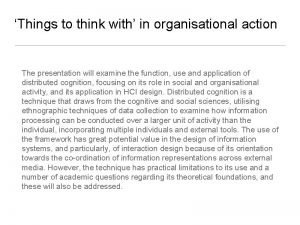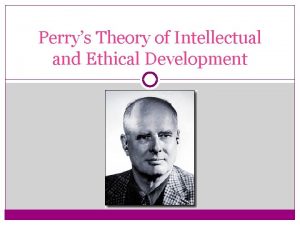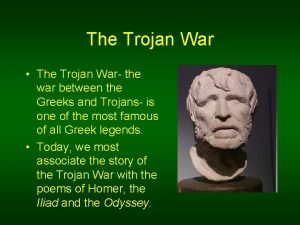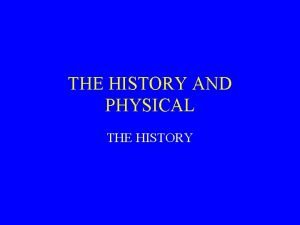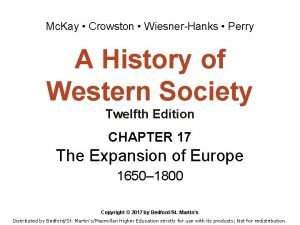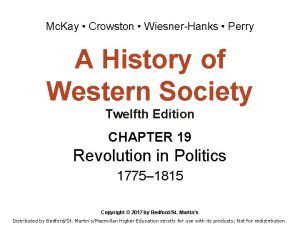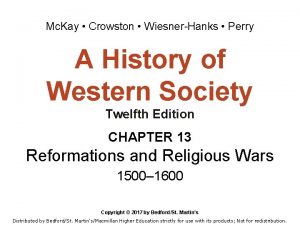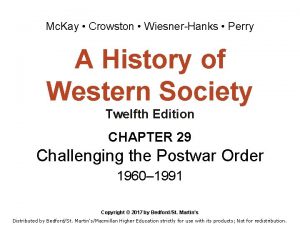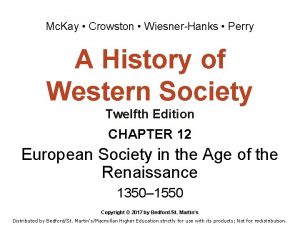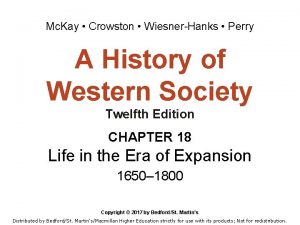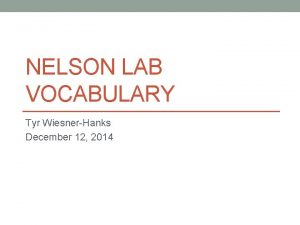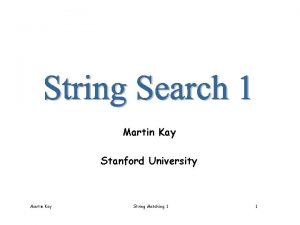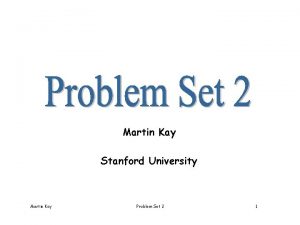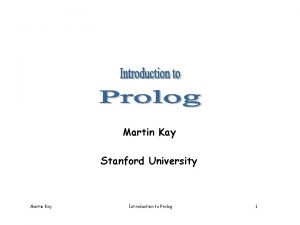Mc Kay Crowston WiesnerHanks Perry A History of




















































- Slides: 52

Mc. Kay • Crowston • Wiesner-Hanks • Perry A History of Western Society Twelfth Edition CHAPTER 16 Toward a New Worldview 1540– 1789 Copyright © 2017 by Bedford/St. Martin’s Distributed by Bedford/St. Martin's/Macmillan Higher Education strictly for use with its products; Not for redistribution.


I. The Scientific Revolution A. Why Europe? 1. With the expansion of Islam, Muslim scholars inherited ancient Greek learning 2. Renewal of learning in western Europe 3. Universities dominated by Aristotle 4. Renaissance and the Scientific Revolution 5. Humanists 6. Fall of Constantinople to the Ottomans (1453) 7. Navigational problems lead to new invention 8. Printing

I. The Scientific Revolution B. 1. 2. 3. 4. 5. Scientific Thought to 1500 Natural philosophy Christianized view of Aristotle World of celestial spheres and the earth Four elements of the earth Ptolemy’s idea that the plants moved in small circles 6. Strengths and limitations of European knowledge


I. The Scientific Revolution C. 1. 2. 3. 4. 5. 6. 7. The Copernican Hypothesis Nicolaus Copernicus (1473 – 1543) Stars and planets revolved around a fixed sun On the Revolutions of the Heavenly Spheres (1543) Implications of the Copernican hypothesis Religious leaders varied in their response The Catholic Church declared the hypothesis false in 1616 New star in 1572 and a new comet in 1577


I. The Scientific Revolution D. Brahe, Kepler, and Galileo: Proving Copernicus Right 1. Tycho Brahe (1546 – 1601) 2. Johannes Kepler (1571 – 1630) 3. Three laws of planetary motion 4. Demolished the systems of Aristotle and Ptolemy 5. Galileo Galilei (1564 – 1642) 6. Law of inertia 7. Discovered the first four moons of Jupiter

I. The Scientific Revolution E. Newton’s Synthesis 1. Isaac Newton (1642 – 1727) 2. Philosophicae Naturalis Principia Mathematica (1687) 3. Law of universal gravitation 4. United the whole universe in one coherent system that prevailed until the twentieth century

I. The Scientific Revolution F. Natural History and Empire 1. Pursuit of knowledge about geographical regions 2. Spanish sponsored scientific expeditions 3. Plants profitable for spices, medicines, dyes, and cash crops 4. Francisco Hernández 5. Carl Linnaeus (1707 – 1778)



I. The Scientific Revolution G. 1. 2. 3. 4. 5. Magic and Alchemy Many astronomers were also astrologers Early modern practitioners of magic Johannes Kepler’s astrological principles Newton fascinated by alchemy Critics of the idea of universal gravitation


II. Important Changes in Scientific Thinking and Practice A. The Methods of Science: Bacon and Descartes 1. Francis Bacon (1561 – 1626) 2. Empiricism 3. The Royal Society 4. René Descartes (1596– 1650) 5. Matter in motion, “quantity of motion” constant 6. Deductive reasoning 7. Modern scientific method combines Bacon’s inductive and Descartes’s deductive reasoning

II. Important Changes in Scientific Thinking and Practice B. 1. 2. 3. 4. 5. Medicine, the Body, and Chemistry New study of the human body Paracelsus (1493 – 1541) Andreas Vesalius (1516 – 1564) William Harvey (1578 – 1657) Robert Boyle (1627 – 1691)


II. Important Changes in Scientific Thinking and Practice C. Science and Religion 1. Most scientists devoutly religious 2. Heliocentrism threatened the place of mankind in creation as stated in Genesis 3. The Holy Office banned the works of Copernicus and Kepler in 1616 4. Galileo Galilei tried for heresy and recanted 5. Some Protestant countries “pro-science”

II. Important Changes in Scientific Thinking and Practice D. Science and Society 1. Rise of international scientific community 2. Governments intervened to support and direct research 3. Science relied on artisans’ expertise 4. New barriers to gender equality 5. Universities in Italy had some exceptions 6. Some female intellectuals were engaged through salons, experiments, and writing

III. The Rise and Spread of Enlightenment Thought 1. Diverse and conflicting ideas debated in international networks 2. Three essential concepts: rationalism, the scientific method, and progress

III. The Rise and Spread of Enlightenment Thought A. 1. 2. 3. The Early Enlightenment The European Enlightenment (ca. 1690 – 1789) Newton’s Principia in 1687 Dutch Republic: religious tolerance and republican rule 4. Pierre Bayle’s Historical and Critical Dictionary (1697) 5. Baruch Spinoza (1632 – 1677)

III. The Rise and Spread of Enlightenment Thought A. The Early Enlightenment 6. Gottfried Wilhelm von Leibniz (1646 – 1716) 7. John Locke’s Essay Concerning Human Understanding (1690) 8. Human mind at birth is a blank tablet 9. Theory of sensationalism

III. The Rise and Spread of Enlightenment Thought B. 1. 2. 3. 4. The Influence of the Philosophes Spirit of inquiry and debate from the philosophes France a hub of the Enlightenment Baron de Montesquieu (1689 – 1755) The Spirit of Laws (1748)

III. The Rise and Spread of Enlightenment Thought B. 5. 6. 7. The Influence of the Philosophes Montesquieu argued for a separation of powers Voltaire (1694 – 1778) A reformer, not a revolutionary

III. The Rise and Spread of Enlightenment Thought B. The Influence of the Philosophes 8. Encyclopedia: The Rational Dictionary of the Sciences, the Arts, and the Crafts 9. Set out to teach people how to think critically 10. Encyclopedists thought knowledge would increase happiness 11. Exalted science, questioned religion 12. Widely read, and extremely influential



III. The Rise and Spread of Enlightenment Thought C. 1. 2. 3. 4. Enlightenment Movements Across Europe A Republic of Letters “Catholic Enlightenment” The Scottish Enlightenment David Hume (1711 – 1776)

III. The Rise and Spread of Enlightenment Thought C. Enlightenment Movements Across Europe 5. Adam Smith, An Inquiry into the Nature and Causes of the Wealth of Nations (1776) 6. Question of reasons and emotions 7. Immanuel Kant (1724 – 1804) 8. Cesare Beccaria (1738 – 1794)

IV. The Social Life of the Enlightenment A. Global Contacts 1. Jesuit missionaries transmitted knowledge of Chinese history and culture to the West 2. Leibniz believed that Chinese ethics and political philosophy were superior 3. Voltaire revered China 4. Montesquieu and Diderot criticized China 5. Attitudes towards Islam similarly mixed 6. Mary Wortley Montagu challenged prevailing ideas of Turkish people

IV. The Social Life of the Enlightenment B. 1. 2. 3. 4. 5. Enlightenment Debates About Race The System of Nature (1735) Scientists investigated the origins of race Of Natural Characters (1748) On the Different Races of Man (1775) New use of word “race” to designate biologically distinct groups of humans 6. Europeans now believed themselves culturally and biologically superior

IV. The Social Life of the Enlightenment B. Enlightenment Debates About Race 1. Scientific racism helped legitimate and justify the tremendous growth of slavery 2. History of the Two Indies (1770) 3. Diderot criticized European attitudes through the voices of outsiders 4. James Beattie (1735 – 1803) challenged claims of white superiority 5. Olaudah Equiano published memoirs testifying to the horrors of slavery


IV. The Social Life of the Enlightenment C. Women and the Enlightenment 1. Marquis de Condorcet urged that women should share equal rights with men 2. Mary Astelll, A Serious Proposal to the Ladies (1694) 3. Women produced 15 percent of published novels 4. Active role in the informal dimensions of the Enlightenment 5. Rousseau’s emphasis on the natural laws governing women

IV. The Social Life of the Enlightenment D. 1. 2. 3. Urban Culture and Life in the Public Sphere Growth of book production and consumption Lending libraries Coffeehouses became meccas of philosophical discussion 4. Book clubs, debating societies, Masonic lodges, and newspapers 5. Philosophes though the masses had no time or talent for philosophical speculation 6. Literacy rates rose; ideas were popularized




V. Enlightened Absolutism 1. Benevolent absolutism 2. Absolutist rules tried to reform their governments with Enlightenment ideals 3. Most influential new-style monarchs illustrate the achievements and limitations of enlightened absolutism

V. Enlightened Absolutism A. Frederick the Great of Prussia 1. Frederick II (r. 1740 – 1786) 2. The European War of the Austrian Succession (1740 – 1748) 3. The Seven Years’ War (1756 – 1763) 4. Peter III called off the attack against Frederick

V. Enlightened Absolutism A. 5. 6. 7. Frederick the Great of Prussia Frederick adopted more human policies Prussian law and legal procedures improved Cameralism


V. Enlightened Absolutism B. 1. 2. 3. 4. Catherine the Great of Russia (r. 1762 – 1796) Set out to rule in an Enlightened manner Intellectual ruler Uprising sparked by Emelian Pugachev in 1773

V. Enlightened Absolutism B. 5. 6. 7. 8. Catherine the Great of Russia Catherine’s stopped trying to reform the system Successful in territorial expansion Divided up Polish territory Poland vanished from the map by 1795




V. Enlightened Absolutism C. 1. 2. 3. 4. The Austrian Habsburgs Maria Theresa (r. 1740 – 1780) Church reforms Administrative reforms Combined state-building with the Enlightenment ideals to expand the role of the state 5. Inherent limitations in Enlightenment thinking


V. Enlightened Absolutism D. Jewish Life and the Limits of Enlightened Absolutism 1. Moses Mendelssohn (1729 – 1786) 2. The Haskalah and social change 3. Most progressive reforms in Austria 4. Frederick the Great of Prussia opposed emancipation for the Jews 5. The Pale of Settlement 6. France all removed restrictions on Jews


 Stella theodoulou
Stella theodoulou Jason perry md
Jason perry md Kuhn perry
Kuhn perry Sunrise sunset swiftly fly the years
Sunrise sunset swiftly fly the years Rhyming words for roar
Rhyming words for roar Matt thiessen
Matt thiessen Perry grigsby
Perry grigsby Dr. perry sugar
Dr. perry sugar Perry aritua
Perry aritua First word on the cross
First word on the cross Reece map
Reece map Perry high school marching band
Perry high school marching band Katy perry poem
Katy perry poem Gabby perry harvard
Gabby perry harvard Dr perry neurologist
Dr perry neurologist Patrick geddes
Patrick geddes Katy perry firework figurative language
Katy perry firework figurative language Mark perry brunel
Mark perry brunel Dr josephine perry
Dr josephine perry William g perry jr
William g perry jr American enterprise institute
American enterprise institute Dog vaccination perry county
Dog vaccination perry county Kalani craig
Kalani craig Perry’s theory of intellectual and ethical development
Perry’s theory of intellectual and ethical development Balamory painter
Balamory painter Figurative language roar
Figurative language roar Dr perry liu
Dr perry liu Videogamelawyer
Videogamelawyer Tyler perry scholarships
Tyler perry scholarships Gabby perry
Gabby perry Theme of trojan war
Theme of trojan war Perry zinn rowthorn
Perry zinn rowthorn Perry babb
Perry babb Perry glasser
Perry glasser Perry laroque
Perry laroque Perry high school marching band
Perry high school marching band Dr richard perry neurologist
Dr richard perry neurologist Chapter 18 apush
Chapter 18 apush Ivan perry
Ivan perry Perry meridian middle school
Perry meridian middle school History also history physical
History also history physical Thelma kay
Thelma kay Kay change the voice
Kay change the voice Apat na benepisyo ng bolunterismo
Apat na benepisyo ng bolunterismo Testování kosmetiky
Testování kosmetiky Boomers
Boomers Pambansa at pampanitikan
Pambansa at pampanitikan Merlin el mago disney
Merlin el mago disney Mary kay esrs training
Mary kay esrs training Dee kay buildcon pvt ltd
Dee kay buildcon pvt ltd Robert lasalle facts
Robert lasalle facts Traditional bento box
Traditional bento box Whilst leila sleeps
Whilst leila sleeps

















